Justice and Peace
ICF Peace Institutes – Training of Trainers
Last Updated (Monday, 30 January 2023 16:02)
From October 26 to November 21, 2022, the Interfaith Cooperation Forum (ICF) successfully held a series of training trainers on conflict transformation, peacebuilding, and peace education at the YMCA International Hotel in Chiang Mai, Thailand. The training welcomed fifteen (15) participants nominated by members/partner organizations from different countries, namely, Myanmar (2), India (2), Vietnam (1), Laos (1), Bangladesh (1), Sri Lanka (1), Philippines (2), Indonesia (1), Timor Leste (1), Cambodia (1), Nepal (1) and Mongolia (1).
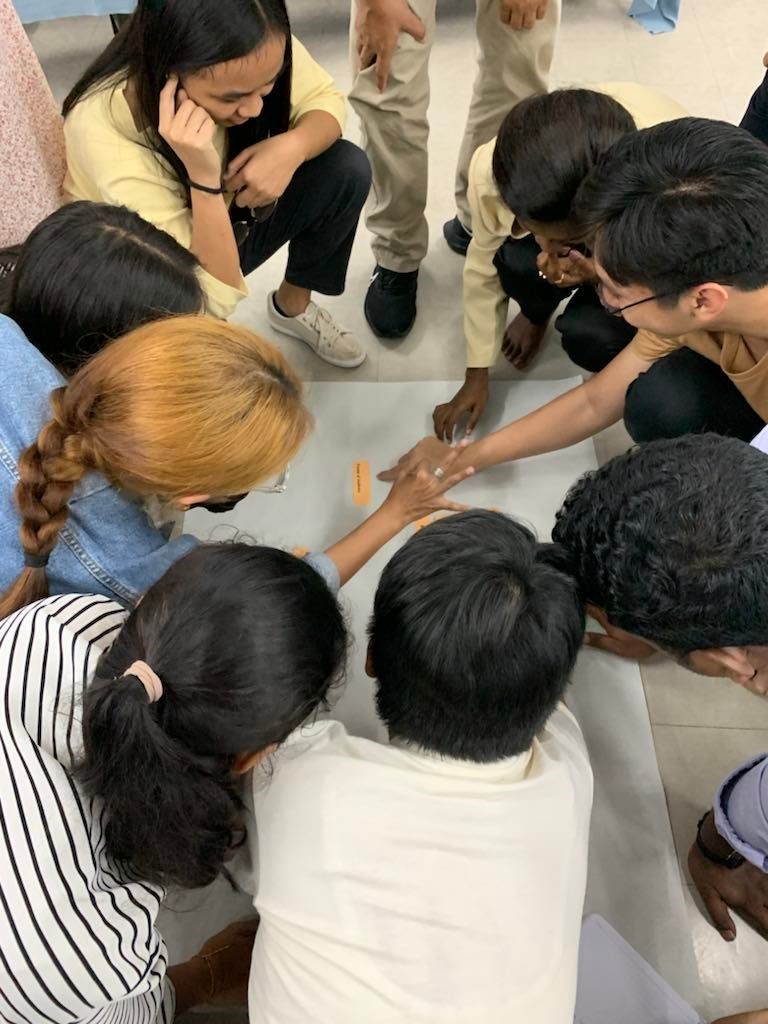 The 26-day training had 2 modules. The first was on conflict transformation and peacebuilding, and the second module was on peace education. Two experienced Nepalese trainers, Dr. Susan Risal and Hari B. Dhami led the sessions of the first module. In this training, the participants studied the definition of conflict, conflict analysis tools, and conflict transformation methods. The course content developed in a non-linear, practical, and learner-centered way blew their mind and brought them many unforgettable experiences. Most of the participants shared that the role-playing activity is one of the most interesting and memorable moments during sessions on the first module. In these sessions, they have experienced numerous characters in case studies that they can easily observe from their daily life and apply knowledge to handle these situations with effective solutions. After that, they could fully assimilate new information and open in-depth discussions relating to conflict and peace topics in their countries. Also, they had a valuable chance to facilitate a two-day workshop on conflict transformation for high school students from Chiang Mai International School. This was the first time for most of the participants had drawn ideas and prepared learning materials. These were done so that students who are not used to discussing the topic of conflict could explain and implement conflict transformation methods in actual situations.
The 26-day training had 2 modules. The first was on conflict transformation and peacebuilding, and the second module was on peace education. Two experienced Nepalese trainers, Dr. Susan Risal and Hari B. Dhami led the sessions of the first module. In this training, the participants studied the definition of conflict, conflict analysis tools, and conflict transformation methods. The course content developed in a non-linear, practical, and learner-centered way blew their mind and brought them many unforgettable experiences. Most of the participants shared that the role-playing activity is one of the most interesting and memorable moments during sessions on the first module. In these sessions, they have experienced numerous characters in case studies that they can easily observe from their daily life and apply knowledge to handle these situations with effective solutions. After that, they could fully assimilate new information and open in-depth discussions relating to conflict and peace topics in their countries. Also, they had a valuable chance to facilitate a two-day workshop on conflict transformation for high school students from Chiang Mai International School. This was the first time for most of the participants had drawn ideas and prepared learning materials. These were done so that students who are not used to discussing the topic of conflict could explain and implement conflict transformation methods in actual situations.
The second module of peace education was conducted by Ma’am Jo Villanueva from the Philippines. The module has given the participants an in-depth understanding of peace education and of peaceable teaching-learning processes and strategies that a peace educator should learn. After the training, participants became aware of the role as well as key characteristics of a peace educator. Sreymenh, a Cambodian participant shared that with the knowledge and skills gained from the training, she felt more confident and willing to conduct a training workshop on conflict transformation and peacebuilding in their communities. Jessi, a participant from Vietnam, shared her impressions on the module: “The participants were full of energy and excitement to approach such a huge topic “Peace” with an alternative way. Ma’am Jo highly integrated diverse learning activities into each session. Not only have we learned about issues relating to peace but also essential and practical skills a peace educator must have.” The module came to an end with a one-day workshop on peacebuilding for guest participants. In contrast to their desire, the participants had to conduct the workshop without any guests due to an unexpected situation. However, they conducted the practicum successfully and gained more experience in handling facilitation issues.
In addition to indoor learning, the participants spent their days off visiting famous tourist attractions in Chiang Mai and participating in extra-curricular activities with Thai locals. During the 26-day training, the participants lived in a truly peaceful environment where people were encouraged to raise their voices, listen to each other, and respect differences and personal privacy.
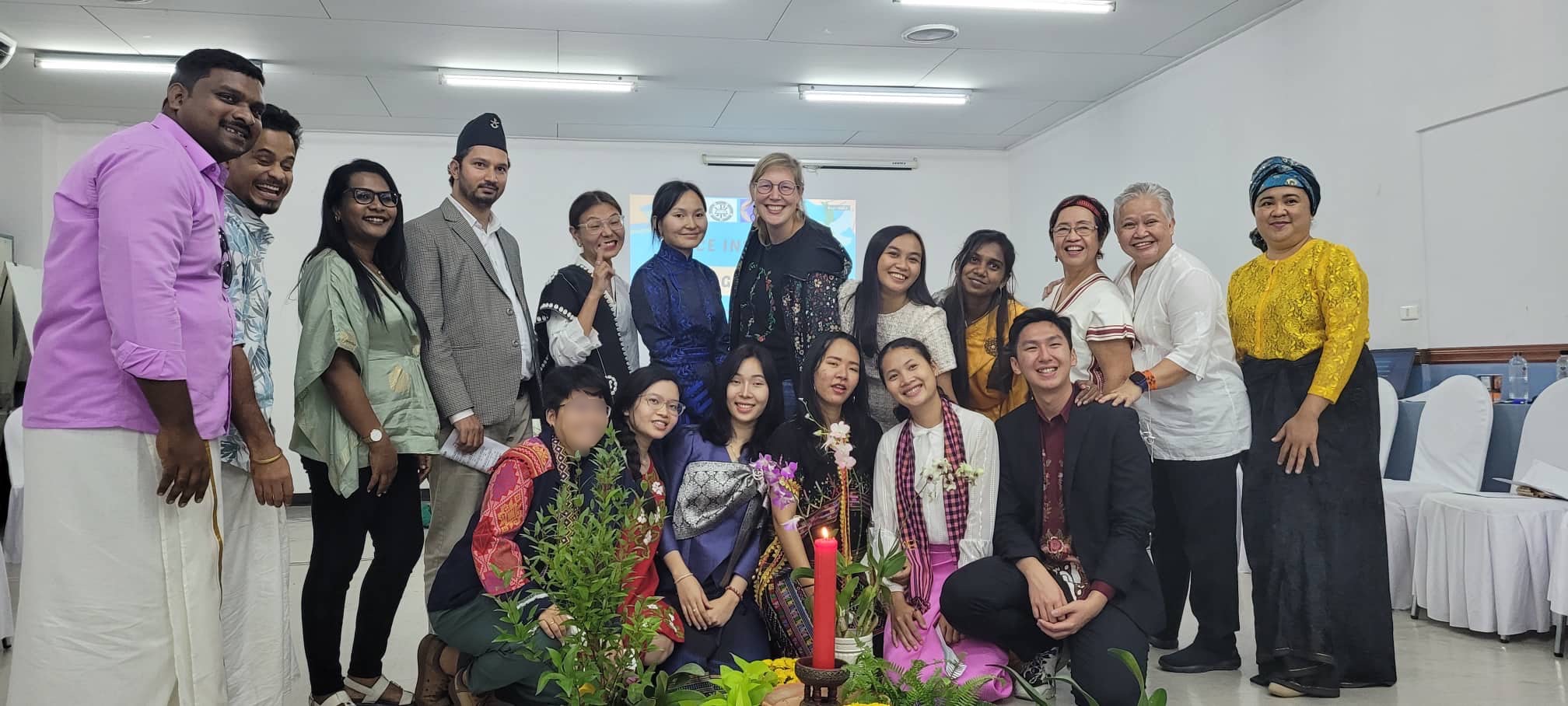
By: Giang Thu Đoàn (Jessi), Vietnam
15 Participants attended Peace Institute III on Conflict Transformation & Peacebuilding
Last Updated (Tuesday, 13 December 2022 12:02)
The Peace Institute III Training of Trainers on Conflict Transformation and Peacebuilding was held from October 27 to November 6, 2022. It was organized by the Interfaith Cooperation Forum (ICF), a project of the Asia and Pacific Alliance of YMCAs (APAY). The training location was YMCA International Hotel, Chiangmai, Thailand. They came from 12 countries, namely: Bangladesh, Cambodia, Indonesia, India, Laos, Mongolia, Myanmar, Nepal, Philippines, Sri Lanka, Timor-Leste, and Vietnam. They all arrived at the venue on Wednesday, October 26, 2022. The ICF staff Ms. Muriel Orevillo-Montenegro and Ms. Baidido Saganding arrived from the Philippines and Ms. Annika Denkmann from Hong Kong. The trainers for this 11-day long journey were Dr. Susan Risal, Ph.D., Chief Executive Officer of Nagarik Aawaz, and Mr. Hari B. Dhami, Program Manager, also of Nagarik Aawaz, Nepal.
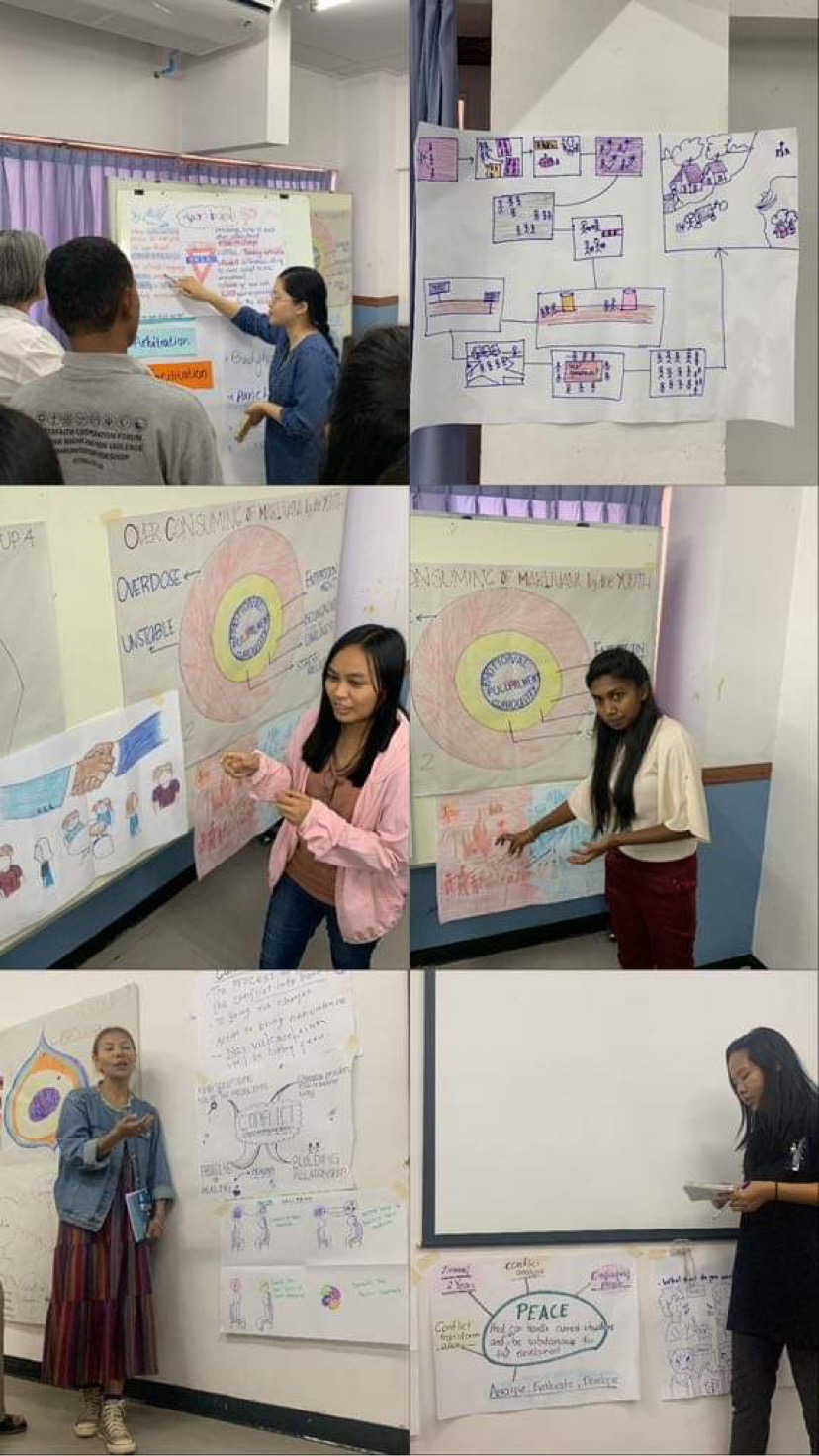 | 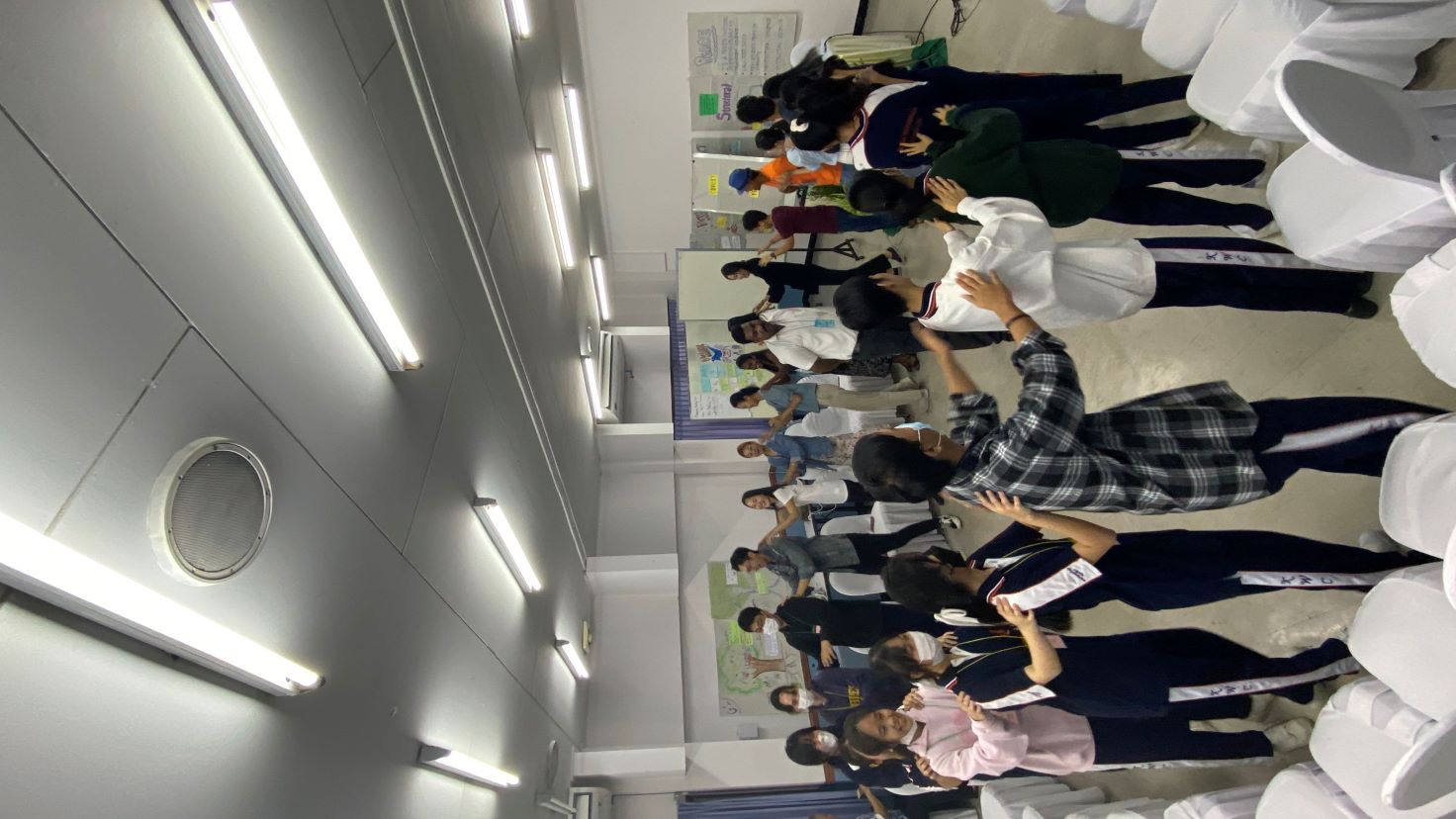 |
| ↑ Participants explain their action plan | ↑ Shalin from India is conducting anenergizer during pracitum |
During the training period, the participants learn to -
- Identify the types and roots of conflict, and conduct an analysis of a conflict happening in their respective locality or country.
- Explain the origins of conflict transformation
- Explain the difference between conflict resolution and conflict transformation
- Identify different methods of transforming conflicts
- Explain the significance of conflict transformation for peacebuilding
- Name at least two conflict situations where conflict transformation was applied that led to
meaningful change
- Identify areas for practical application of the learned tools and skills in their local contexts
- Create and facilitate a teaching module on conflict transformation, applying learned tools and
methods.
Read more: 15 Participants attended Peace Institute III on Conflict Transformation & Peacebuilding
ICF Training of Trainers on Human Rights and Advocacy
Last Updated (Monday, 01 August 2022 12:26)
From June 14 to 25, 2022, the Interfaith Cooperation Forum held a Peace Institute- Training of Trainers in the Philippines. ICF welcomed 10 students and one observer-participant from 7 countries, including Bangladesh, Cambodia, Laos, Nepal, Philippines, Timor-Leste, and Việt Nam, who came to Dumaguete City to join the training of trainers workshop. The training theme was Human Rights and Advocacy. The training was anchored on the hope of young people creating a peaceful and sustainable world together. ICF invited the following facilitators to lead various sessions: Ms Dessa Quesada-Palm, a theatre artist and head of the National Committee on Dramatic Arts of the National Commission for Culture and the Arts; Carlton "Cobbie" Palm, a Presbyterian Church-USA Mission Co-Worker born in Dumaguete, and Ernest Hope Tinambacan, a theatre artist and songwriter. The Peace Institute students have successfully completed the course with many memorable experiences.
What did we learn during the 10-day training?
1. We learned deeply as we clustered human rights into categories.
We approached and analyzed the development and the provisions of the United Nations Charter and the basic provisions of the Universal Declaration of Human Rights (UDHR). We studied major human rights covenants and protocols, such as the International Covenant on Civil and Political Rights (ICCPR), and the International Covenant on the Economic, Social, and Cultural Rights (ICESCR). Political Rights are the contents of the law of people's participation in politics and governance. Civil rights are the content of the judiciary and penal systems. These are the rights that protect Justice. Social rights guarantee a healthy quality of life for all persons, while economic rights guarantee meaningful work, production, and services. Cultural rights are the guarantees of cultural respect and freedom, and collective rights are the guarantees of the state to protect the environment and natural resources.
The participants had an open space to discuss, do in-depth research, and relate to the implementation and practice of the ICCPR and ICESCR in different countries. In addition, the class also approached international organizations that protect human rights and proposed solutions from a multi-dimensional perspective on multiculturalism among different countries and religions.
2. We gained skills in applying theatre art in human rights advocacy
During the sessions, the participants engaged in collective activities to awaken and connect to the different parts of the body. The exercises enabled the participants to explore and develop ways of using theatre art as an effective tool or method to advocate and promote human rights. We experimented on the elements of theatre forum, storytelling, and simulation of human rights abuse situations and short plays. The participants also learned from their fellows concerning the issues in each country, such as red-tagging, freedom of speech, sea pollution, gender equality, etcetera.
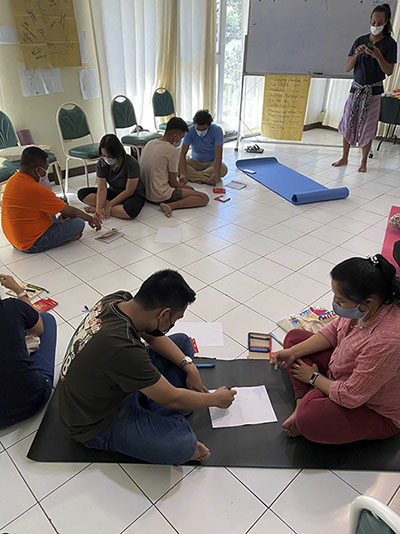 | 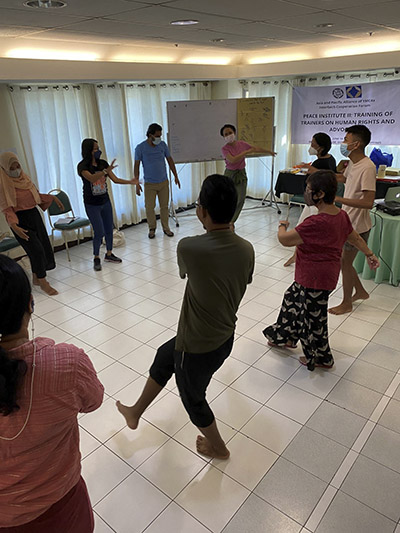 |
Read more: ICF Training of Trainers on Human Rights and Advocacy
ICF organized an in-person Training of Trainers on Nonviolent Communication
Last Updated (Tuesday, 28 June 2022 15:47)
On June 6-10, 2022, the Interfaith Cooperation Forum organized a five-day in-person Training of Trainers on Nonviolent communication. The activity took place at Bethel Guest House, Rizal Boulevard, Dumaguete City, Philippines. Nine participants attended the Training of Trainers. 4 were males and 5 were females from four Asian countries, such as Bangladesh, Philippines, Timor-Leste, and Nepal. In terms of religious representation, 5 of them were Christians, 1 was a Hindu, and 3 were Muslims. The participants of the in-person Training of Trainer’s practicum were those who have complied with the requirements of the on-line sessions held on March 7-30, 2022 with satisfactory rating.
Through hosting Training of Trainers on Nonviolent Communication (NVC), the ICF expect those who received the certificates to contribute as facilitators in as in activities in their local or national contexts and in some ICF activities in the future. ICF reached out to a diverse group of young people who wanted to contribute in promoting peace through learning and practicing the nonviolent communication. The whole in-person Training of Trainers was designed to be divided into two important parts. The first part was a review of the principles of NVC. The second part was the practicum.
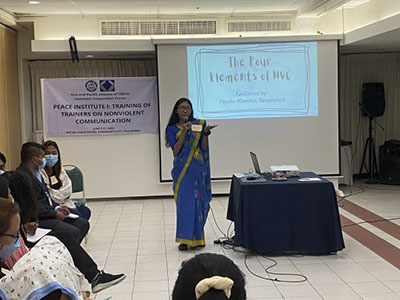 | 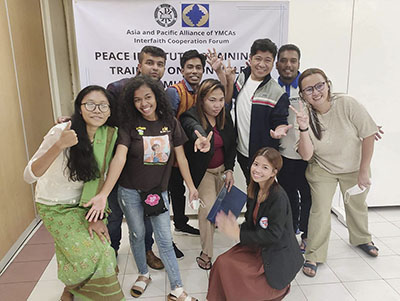 |
The first part included the Elements/Components and Principles of Nonviolent Communication, Exercises on Empathy, Options in receiving hard-to-hear messages and The 13 NVC Dance Steps. The Training of Trainers started with greetings from the staff of ICF. Dr. Muriel Orevillo-Montenegro introduced the goals and purpose of the TO, and oriented the participants on the program flow of the training. The rest of the first two days had the resource persons, Amina T. Mambuay and Lara Mambuay, giving review inputs on the basic elements, principles, and other aspects of NVC. The new part of NVC that participants learned, as these could not be done online, were the exercises on Four Chairs – of giving empathey to others, and the Four Ears – of receiving hard to hear messages.
Read more: ICF organized an in-person Training of Trainers on Nonviolent Communication
APAY in solidarity with victims in Sri Lankan Crisis
Last Updated (Thursday, 26 May 2022 13:29)
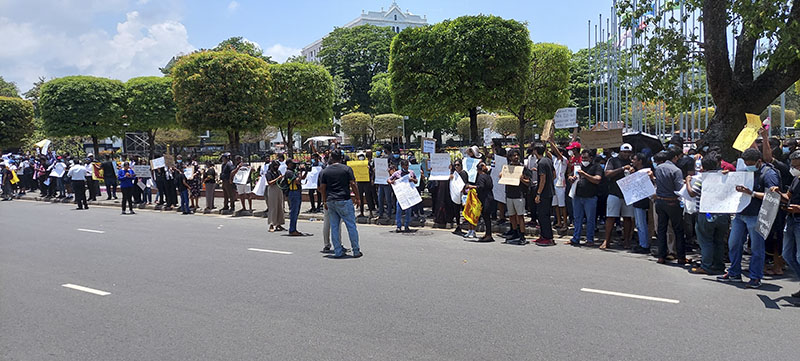
16th May 2022
The crisis in Sri Lanka, which has seen protests that were mostly peaceful on the streets of Colombo for over a month, has now descended into deadly violence after Prime Minister Mahinda Rajapaksa announced his resignation. The defense ministry has ordered troops to shoot on sight after it granted its military and police emergency powers to arrest people without warrants after government and public properties were burned and eight people died in the violence. There is now a serious risk of militarization and the weakening of institutional checks and balances in Sri Lanka. It is impossible to monitor if human rights are not abused in a situation where there is a state of emergency, curfew and social media blackout.
Read more: APAY in solidarity with victims in Sri Lankan Crisis
Read more...
Page 2 of 9





